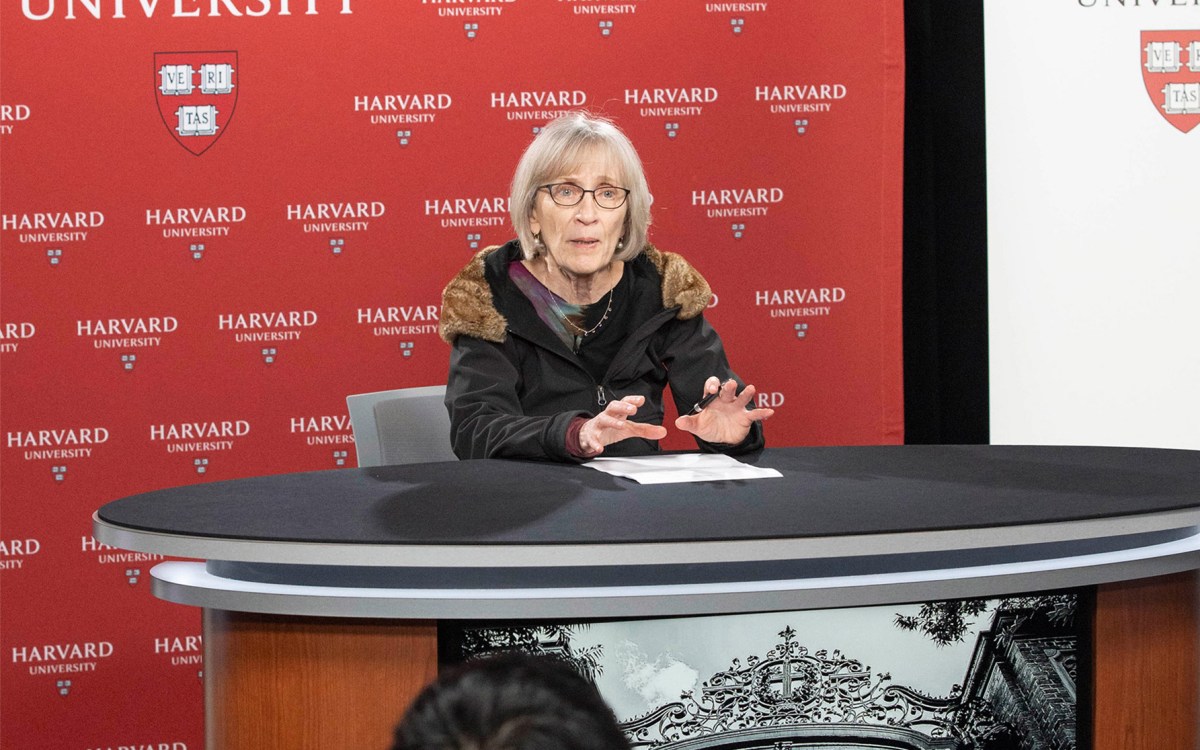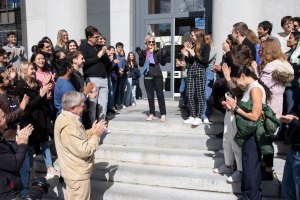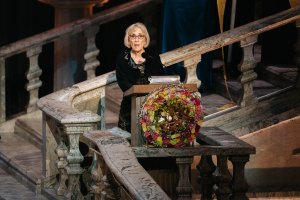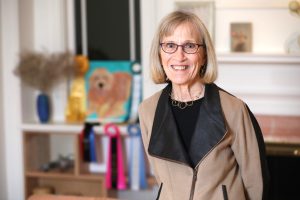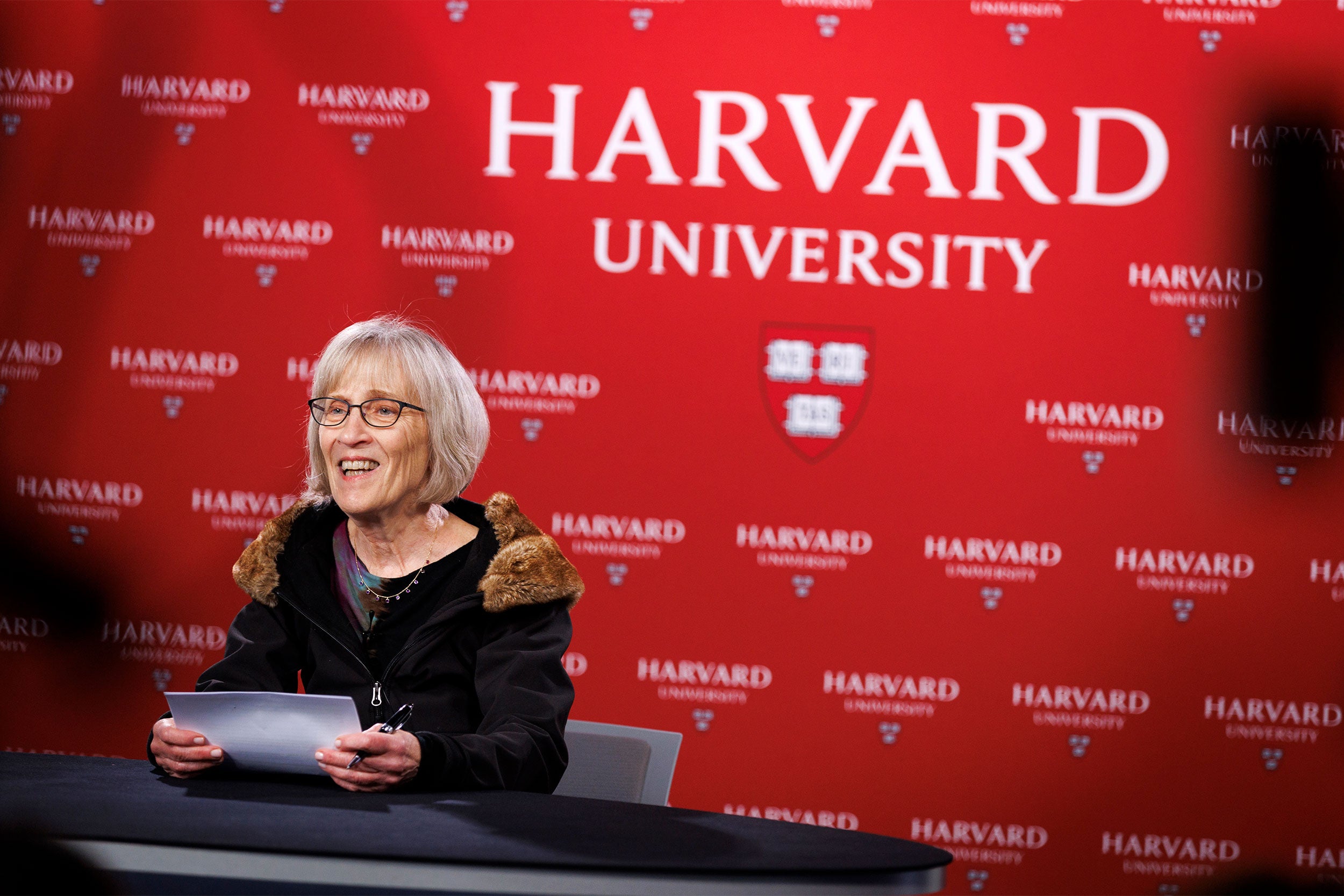
Professor Claudia Goldin at an afternoon press conference.
Stephanie Mitchell/Harvard Staff Photographer
‘Those inequalities are inequalities that occur within households’
Economist Claudia Goldin wins Nobel Prize for tracking American women’s labor participation over centuries, evolution of wage gap
Claudia Goldin found that studying the history of women’s participation in the U.S. labor force required a bit of detective work.
“When I first started working on this subject, I realized that most economic historians were studying child labor, or they were studying the labor of men,” said Goldin, the Henry Lee Professor of Economics. “But they didn’t really know what women were doing. And so that’s what I worked out.”
Goldin, 77, would, in fact, provide the first comprehensive history of American women’s earnings and job market outcomes through the centuries, tracking the evolution of the nation’s gender wage gap. For her efforts the Royal Swedish Academy of Sciences awarded her the Nobel Memorial Prize in Economic Sciences on Monday, making her only the third woman to win the prize and the first to do so solo.
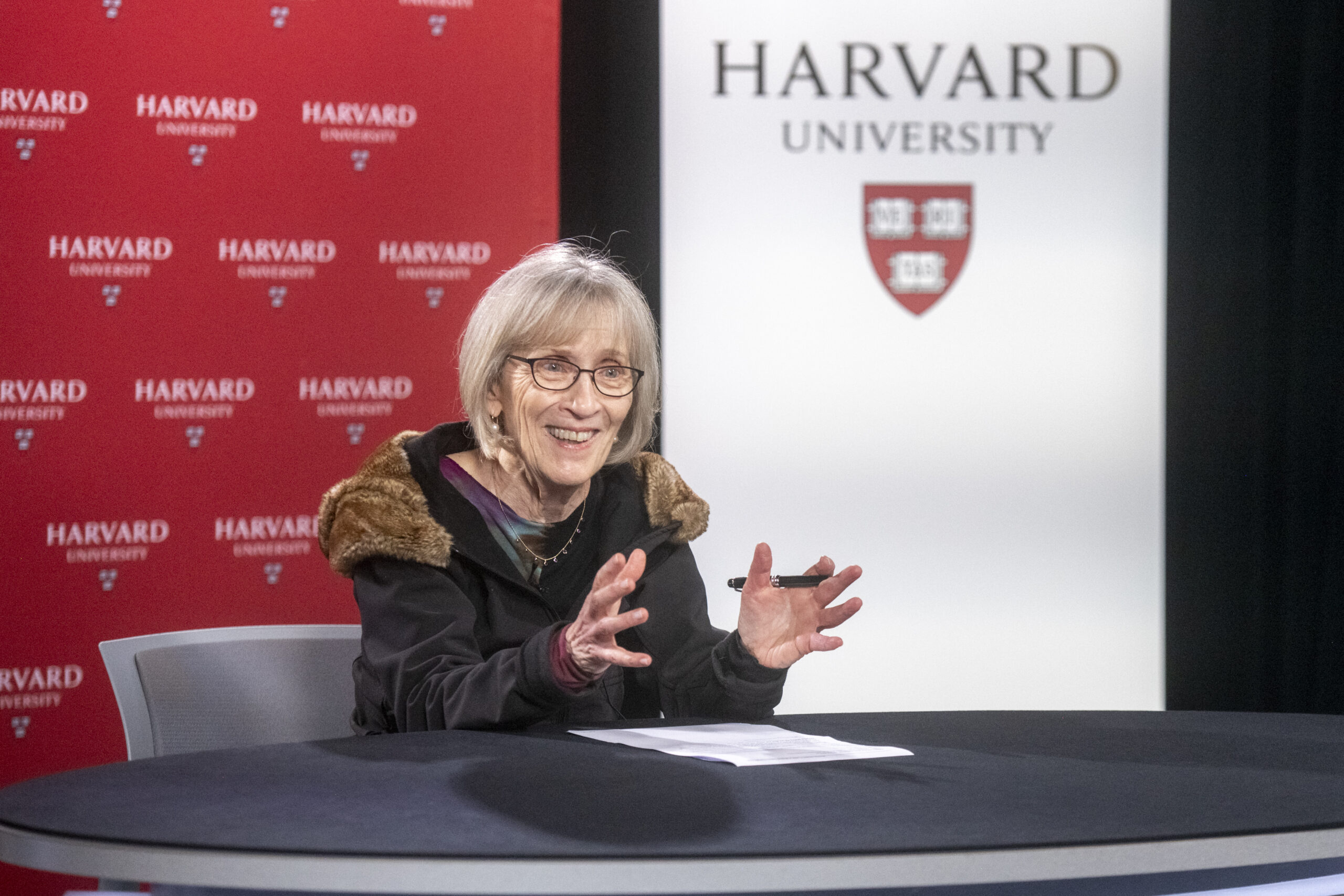
Harvard’s Claudia Goldin awarded Nobel Memorial Prize in Economic Sciences
“Claudia Goldin is a pioneering economist,” said Harvard President Claudine Gay. “Her groundbreaking contributions to our understanding of the gender wage gap and patterns of women’s participation in the labor market have helped deepen awareness of these issues and made progress possible. The entire Harvard community sends our congratulations to Professor Goldin for this remarkable achievement.”
Hopi Hoekstra, Edgerley Family Dean of the Faculty of Arts and Sciences, echoed Gay’s praise.
“Through Professor Goldin’s groundbreaking, far-reaching research, we come to understand how the demands of balancing career and family are experienced personally, in individual lives, but in a broader context,” Hoekstra said. “With the long view of an historian and the exacting precision of an economist, she reveals both the enormous gains made by women in the workplace over time and the many ways in which true equity remains out of reach. I am thrilled to see Professor Goldin and her work recognized in this way.”
“I am standing here because I have students. My students are my muses. My students are the individuals I depend upon to listen to my ideas and to react to them.”
Claudia Goldin
As Goldin walked across campus Monday, she expanded upon the challenges of tracking women’s labor force participation across American history. “The census would ask, ‘What is your gainful occupation?’” explained the 34-year veteran of Harvard’s Economics Department, who holds the secondary title of Lee and Ezpeleta Professor of Arts and Sciences. “And women would say, ‘Well, I’m a housewife.’ You couldn’t say two things.”
That sent Goldin searching for novel data sources over the course of her career, from 1930s sex-segregated job listings to 18th-century business directories that told fuller stories about women’s income-generating activities outside the home.
One of the central findings of Goldin’s research is that differences in pay and labor force participation are due not to biological differences but to differences in the division of unpaid caregiving responsibilities between heterosexual couples.
“We’ve come to a point in which women’s employment is extremely high, and yet there are inequalities,” Goldin said in a pre-dawn telephone interview. “And those inequalities are inequalities that occur within households.”
As evidence, Goldin cited employment trends during World War II, when female labor force participation spiked thanks to the availability of subsidized daycare and after-school programs. Similarly, the post-pandemic rise in women’s paid employment was a result of what Goldin called the “silver lining” of remote work, which created greater workplace flexibility for mothers and other family caregivers.
In fact, women’s labor force participation was subject to many fluctuations across the 20th and 21st centuries relating to shifts in the economy and cultural values. Meanwhile, rates for men remained relatively stable. “For economists, change is important — change is interesting,” Goldin quipped at a midday press conference. “Therefore, men are boring and women are interesting.”
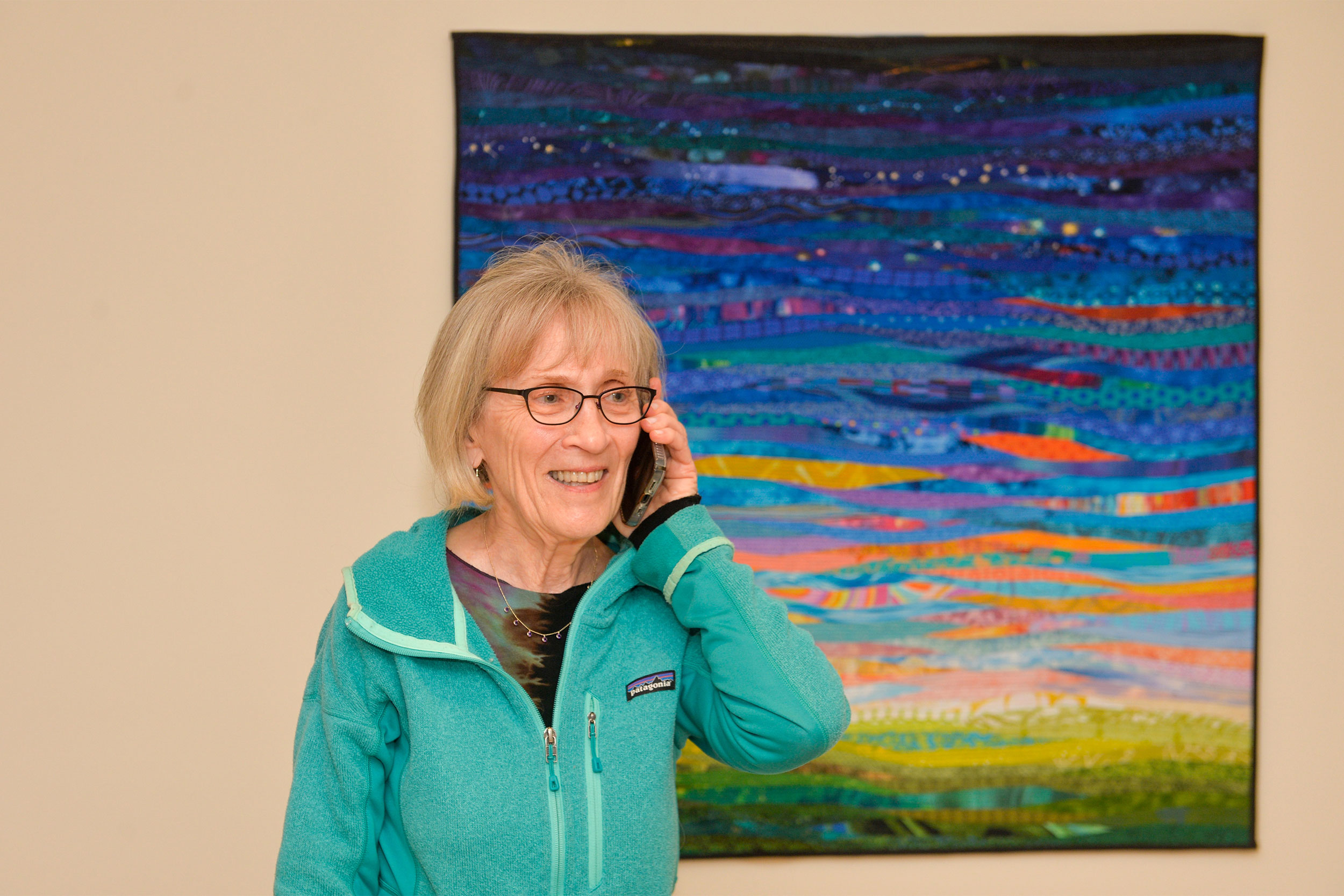
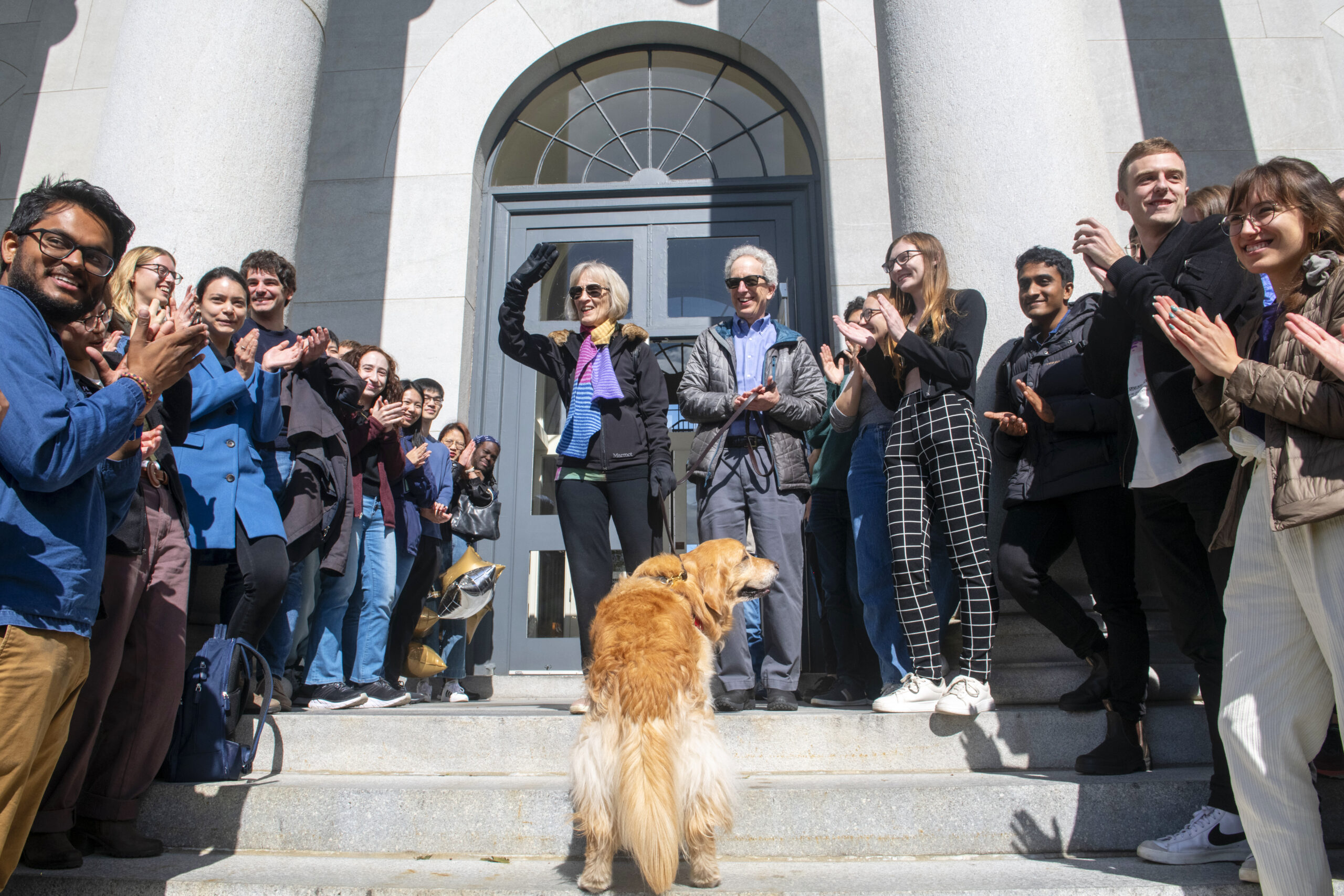
Professor Goldin in her home receiving congratulatory calls after winning the Nobel in economic sciences. On the steps of Harvard’s Littauer Center, Goldin and her husband, Lawrence Katz, and their dog Pika are greeted with applause.
Photos by Jon Chase/Harvard Staff Photographer
Goldin earned her bachelor’s in economics from Cornell University before completing her graduate studies at the University of Chicago. “I worked on many different subjects in the field of economic history before I discovered my true calling … which was the study of women and gender,” she said at the press conference.
It was a collaboration with economic historian Robert Fogel, her mentor and 1993 Nobel laureate, which sparked her interest in working women. Fogel was conducting research for “Time on the Cross,” his 1974 work on the economics of American slavery, while Goldin explored the related topic of slavery in urban settings. That got Goldin wondering why Black women’s labor force participation exceeded that of their white counterparts from Reconstruction through the mid-20th century.
Could this racial gap be explained by differing cultural norms around women’s work established during slavery? Goldin’s answer, published in the Journal of Economic History in 1977, represented her first investigation of women’s labor force participation over U.S. history.
“This was written during a time period in which no one was asking these questions, certainly not in my field,” offered Edward Glaeser, the Fred and Eleanor Glimp Professor of Economics and chair of the Economics Department, who opened Monday’s press conference.
Goldin’s first book on the topic, “Understanding the Gender Gap: An Economic History of American Women,” arrived in 1990. Subsequent mileposts include a 1995 paper on women’s “U-shaped” participation in the labor force as countries develop, a 2002 study on the impact of contraception on decision-making around career and family, and the oft-cited 2000 paper “Orchestrating Impartiality,” which tracked the rise of women in classical music with the advent of “blind” auditions, performed behind identity-concealing curtains. At the Radcliffe Institute, where she was the Katherine Hampson Bessell Fellow in 2005-2006, Goldin examined family and career transitions of male and female graduates from the 1960s to the present.
Goldin’s most recent book, “Career and Family: Women’s Century-Long Journey Toward Equity” (2021), charted changes in the mix of work-life arrangements over five generational groups of mostly white, college-educated American women. The book also introduced Goldin’s concept of “greedy work,” in which employers in certain industries demand long hours — and reward the unencumbered (mostly male) workers who provide it.
“For economists, change is important — change is interesting. Therefore, men are boring and women are interesting.”
Claudia Goldin
“It’s not simply what goes on in the family and the home,” Goldin said. “Workplaces haven’t caught up with [rapid changes] either.”
Also mentioned at the press conference was Goldin’s new paper, “Why Women Won,” published by the National Bureau of Economic Research on Nobel Monday. “It was not that long ago that women could be fired not just for being pregnant … but being capable to be pregnant,” she explained. “Women have won a tremendous amount and if you read my paper, you’ll see exactly how that happened.”
“We are enormously proud of what she has brought to this University and to the wider world of knowledge, particularly with regard to gender inequality in work and family life,” said Lawrence D. Bobo, dean of social science and the W.E.B. Du Bois Professor of the Social Sciences. “The Nobel committee could not have made a more fitting selection.”
The call from the Royal Swedish Academy of Sciences arrived around 4:30 a.m., said Goldin, who was sleeping at home with her husband, Lawrence Katz, the Elisabeth Allison Professor of Economics, and their “furry family member” Pika, the couple’s 13-year-old Golden Retriever.
“I could hear her speaking and it sounded like good news,” Katz said as he walked Pika toward Littauer Hall, where colleagues and students waited to cheer Goldin’s arrival.
As Harvard economists gathered Monday afternoon to celebrate Goldin’s achievement, many praised Goldin’s generosity with her time as a mentor, colleague, and community-builder.
In fact, Alex Chan, an assistant professor at Harvard Business School, would later point out that Goldin went to her office after the party to meet with graduate students seeking job market advice.
“Most people would probably be doing only media work and trying to soak in the attention,” Chan said in an email. “But my colleague is such an insanely committed teacher that on the day she won the Nobel Prize she was just working one-on-one with her students all day!”
For her part, Goldin emphasized the importance of these students — whom she called her “muses” — to her work.
“I deeply thank my students — my undergraduates, my graduate students — who push me to the frontiers of knowledge every day,” she said at the press conference. “I could never do research, I could never be where I am today, without them.”



